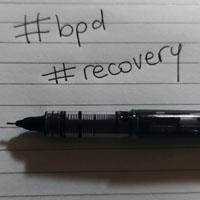Reflective functioning and personal recovery process of users with borderline personality disorder on Instagram: an explorative study using computerized and thematic analysis

Accepted: September 12, 2020
HTML: 23
All claims expressed in this article are solely those of the authors and do not necessarily represent those of their affiliated organizations, or those of the publisher, the editors and the reviewers. Any product that may be evaluated in this article or claim that may be made by its manufacturer is not guaranteed or endorsed by the publisher.
Authors
Although recent literature has stated that mentalizing (or reflective functioning; RF) promoted the clinical recovery (symptomatic remission; CR) of individuals with borderline personality disorder (BPD), to our knowledge, there have been no studies that analyzed the relationship between RF and a process more complex than CR, namely personal recovery (PR) - a deep and unique process of change in one’s attitudes, values, feelings, goals and/or roles. Furthermore, while there have been a few studies concerning PR of BPD individuals, but to date none analyzed PR of BPD individuals through online narratives shared on social media platforms. This study investigates the relationship between RF and PR of 14 Instagram users with a selfreported diagnosis of BPD. Two groups of users were distinguished on the basis of hashtags, #bpd and #bpdrecovery. Seventy randomized text posts (5 from each user) were extracted from users’ profiles: 35 from the #bpd group and 35 from #bpdrecovery. Two methods of analysis were applied: i) a thematic analysis, by using the theoretical framework CHIME, which identifies five dimensions of PR; and ii) a stylistic analysis of RF utilizing computerized reflective functioning (CRF), which identifies RF lexical markers. Results indicate that the #bpdrecovery group presented more dimensions of PR, and that its posts showed a significantly higher RF than the #bpd group. These findings suggest that RF could be involved in the PR of BPD individuals, thus mentalization-based treatment could be effective in supporting PR processes and enhancing the impaired RF in BPD users even in the online context.
How to Cite

This work is licensed under a Creative Commons Attribution-NonCommercial 4.0 International License.
PAGEPress has chosen to apply the Creative Commons Attribution NonCommercial 4.0 International License (CC BY-NC 4.0) to all manuscripts to be published.
Similar Articles
- Alessandro Talia, Madeleine Miller-Bottome, Rachel Wyner, Peter Lilliengren, Jordan Bate, Patients’ Adult Attachment Interview classification and their experience of the therapeutic relationship: are they associated? , Research in Psychotherapy: Psychopathology, Process and Outcome: Vol. 22 No. 2 (2019)
- Irene Messina, Salvatore Gullo, Omar Carlo Gioacchino Gelo, Cecilia Giordano, Silvia Salcuni, An overview of the Italian contribution to the international multisite SPRISTAD study on psychotherapy training , Research in Psychotherapy: Psychopathology, Process and Outcome: Vol. 22 No. 3 (2019)
- Francesca Locati, Pietro De Carli, Margherita Lang, Laura Parolin, The flip side of collaborative alliance: a single-case study , Research in Psychotherapy: Psychopathology, Process and Outcome: Vol. 22 No. 2 (2019)
You may also start an advanced similarity search for this article.

 https://doi.org/10.4081/ripppo.2020.463
https://doi.org/10.4081/ripppo.2020.463




